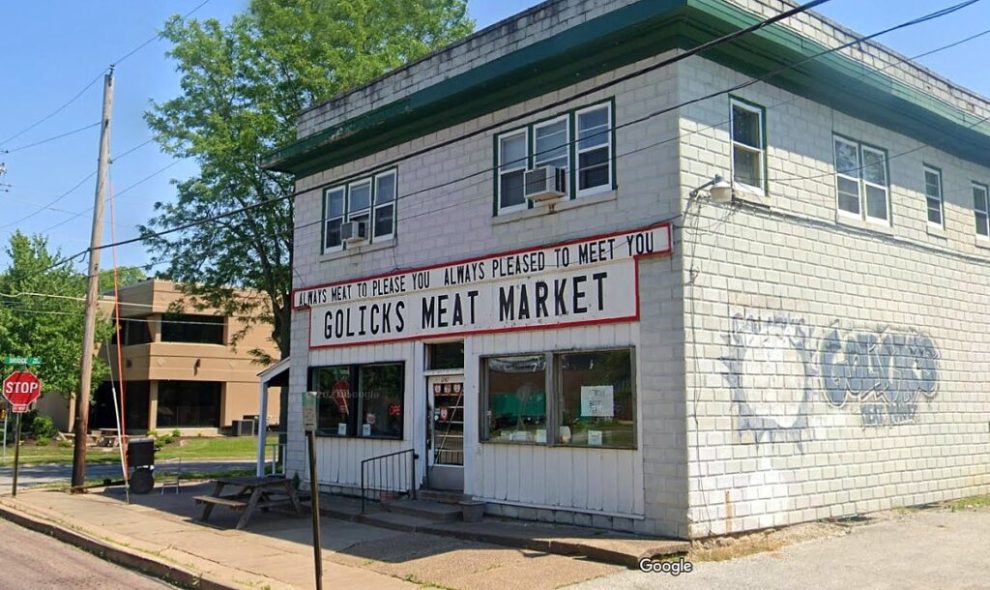State, city and county food inspectors have cited Iowa restaurants and stores for hundreds of food-safety violations this past month, including moldy taco meat, beef marked “Not For Sale,” long-expired milk, and unskilled workers preparing sushi that failed to meet minimum safety standards.
One Des Moines food store was found to be importing fish directly from Thailand, which meant that none of it went through the usual process of being inspected and certified as safe. At the same store, whole chickens from an unknown, unlabeled source were being sold to the public.
At an Iowa school where moldy cheese was found, cafeteria workers weren’t date-marking the food. At another school, there was no certified food protection manager on staff and food was routinely kept at room temperature and then thrown away rather than being refrigerated and preserved.
The findings are reported by the Iowa Department of Inspections and Appeals, which handles food-establishment inspections at the state level. Listed below are some of the more serious findings that stem from inspections at Iowa restaurants, stores, schools, hospitals and other businesses over the past four weeks.
The state inspections department reminds the public that their reports are a “snapshot” in time, and violations are often corrected on the spot before the inspector leaves the establishment. For a more complete list of all inspections, along with additional details on each of the inspections listed below, visit the Iowa Department of Inspections and Appeals’ website.
Back Berner Bar & Grill, 607 E. Marengo Road, Tiffin – During a Nov. 21 visit, a Johnson County inspector cited the establishment for having no sanitizer on the premises and for using a non-continuous method of cooking chicken wings that had not been approved by the county. In addition, several house-made sauces were found to have been prepared more than a week prior and were outdated. This was the third consecutive inspection in which that issue was identified by inspectors and so a formal letter of warning was issued. One of the outdated sauces was dated Sept. 16, a full two months prior to the inspection.
Hacienda Vieja, 1518 3rd Ave. NW, Fort Dodge – During a Nov. 21 visit, the restaurant was cited by a state inspector for nine violations. Raw chicken had been stored in a cooler drawer directly behind cut vegetables; one of the coolers was holding food at 52 degrees, rather than 41 degrees or below; eggs were stored unrefrigerated on a shelf and had to be discarded, and salsa was stored unrefrigerated on a counter top.
Also, diced tomatoes, onions, and meat products were not marked with any dates to ensure they were still safe to consume; unspecified items in the food-prep cooler were held past the allowable seven-day period and had to be discarded; containers of hot food were left uncovered, creating a risk of contamination; containers of food, including salsa, were left uncovered in one of the coolers; and there were dented cans of food in the storage area that needed to be discarded.
St. Kilda, 300 SW 5th St., Des Moines – During a Nov. 21 visit, a state inspector cited the establishment for holding quart containers of potentially hazardous food items – including roasted tomatoes, roasted potatoes, diced tomatoes, chorizo, ham and cheese pastry — in pans of ice rather than keeping them refrigerated. Both containers were holding food above the maximum allowable temperature of 41 degrees and so the food was discarded. That was a repeat violation, the inspector noted. In addition, there was no hand soap available at the handwashing sink in the kitchen.
The inspector also found smoked salmon that was dated Nov. 13, and cooked grains that were dated Nov. 11, and so both had to be discarded. Also, there were no sanitizing cloths in use for wiping off counters and equipment in the kitchen, and floor tile in the kitchen was damaged and missing, allowing water to pool in some areas. Also, the restaurant had not posted its most recent inspection report and had not posted a copy of its license.
Crossroads Bistro, 232 16th Ave. SW, Cedar Rapids — During a Nov. 18 visit, a Linn County inspector noted that access to the kitchen’s handwashing sink was blocked, and said several food items – including cheese, soup, beef stew, pork and gravy — had no date markings on them to ensure freshness and safety. Also, the inspector was unable identify who on the staff was a certified food protection manager, although the person in charge said there was such a person, but they were not present at that time.
The inspector observed a cook cracking raw eggs and then toppings on an omelet without changing gloves or washing their hands. In addition, boxes of raw meat were stored directly on the floor of a walk-in freezer; one pan of cooked food was stored in a cooler uncovered, risking contamination, and another pan of cooked food was covered by an empty cardboard box.
Tony Roma’s Grand Harbor, 350 Bell St., Dubuque – During a Nov. 18 visit, a city inspector noted there was no soap at a handwashing sink and the final rinse temperature of the kitchen dishwasher was measured at a too-cool 148 degrees. The handwashing sink was unable to reach the minimum temperature of 100 degrees.
Sausage links that were cooked that morning and placed in a walk-in cooler were still holding at 83 degrees and had to be discarded, and house-made bourbon barbecue sauce that contained cooked onions was being held at room temperature and had to be discarded. Also, chipotle garlic sauce that was to be used by Nov. 8, and shrimp that was to be consumed by Nov. 8, were still on hand and had to be discarded.
Cast Iron Café, 404 Broad Ave., Stanton – During a Nov. 16 visit, a state inspector cited the establishment for 11 violations, an unusually high number. Food-service employees were seen handling soiled dishes, then returning to food preparation without washing their hands or donning gloves.
The kitchen’s reach-in cooler and freezer contained beef that was marked “Not For Sale,” and which had to be removed from the premises.
Also, the reach-in cooler contained sliced cheese, diced tomatoes, cut lettuce and deli meats that lacked any date-markings to ensure freshness and safety; a potato slicer was heavily soiled with food-like debris; access to the kitchen’s handwashing station was blocked; and chemicals that were in unlabeled containers had been stored in the food-preparation area.
In addition, there was no thin-tipped, probe-style thermometer on hand to measure food temperatures; there were large bins of “white substances” in the kitchen that were not properly labeled; ceiling and floor tiles were missing in the kitchen area; and there was an “abundance of maintenance tools” being stored in the kitchen’s food-preparation area.
Fujisan Sushi at Sam’s Club, 305 Airport Road, Ames – During a Nov. 16 visit, a state inspector cited the establishment for food that was holding just above the maximum temperature of 41 degrees, including tempura shrimp at 42 degrees and crab at 43 degrees.
Also, the establishment was not following the required Hazard Analysis Critical Control Points protocol for identifying and managing risks related to sushi and raw-food production. The inspector noted there was no current HACCP plan on the premises, and there were issues with the proper calibration of the pH meter and the process used to test the pH level of the rice. Also, the establishment had not filled out the logbook with the dates of pH testing and other safety-related information.
The inspector also noted that the establishment was thawing crab meat in stagnant water rather than in running water.
Hy-Vee Foods, 2540 Euclid Ave., Des Moines – During a Nov. 16 visit, a state inspector noted that the required shellstock identification tags – used to track the source of shellfish in the event of a food-related outbreak of some kind – were not maintained alongside the store’s Cherrystone Clams, Littleneck Clams and Chesapeake Pride Oysters. Also, an inspection of the store’s Hickory House Kitchen indicated there was raw ground beef stored above a whole roast inside one cooler, and packages of raw chicken were stored above whole-muscle meat on a cart.
In addition, “heat-treated potatoes” were measured at 59 degrees on the breakfast area’s food preparation table; sliced ham was holding at 61 degrees; and cooked sausages were measured at 46 degrees. All of those items had to be discarded as their holding temperatures weren’t hot enough to ensure food safety.
The inspector also noted that sliced turkey, sliced roast beef, cooked chicken, sausages, pico de gallo, and other foods were not marked with their preparation or opening dates. In the Hy-Vee Chinese area, packages of raw, unwashed mushrooms were stored directly on uncovered pans of cooked beef and chicken inside a walk-in cooler.
In addition, crab Rangoon was being held at 88 degrees, which was too cool to ensure safety; and egg rolls were held at 128 degrees. The egg rolls were reheated to 165 degrees and the crab Rangoon was discarded. In the Hy-Vee Chinese area, “pooling water and debris” was accumulating on the floor below the wok and the adjacent reach-in cooler. In the Hickory House Kitchen area, water was pooling on the floor near a handwashing sink.
The inspection was in response to three non-illness complaints. One complaint pertained to sanitation in the bottle-redemption area; one concerned sanitation in the Market Grille area; and the third concern alleged adulterated food in the meat, dairy and Hy-Vee Chinese areas. All three complaints were deemed unverifiable.
Hy-Vee Foods, 3140 Agency St., Burlington – During a Nov. 16 visit, a state inspector noted that various, unspecified food items in the kitchen and in the Hy-Vee Chinese areas were not date-marked; a handwashing sink in the meat department could not reach the minimum hot-water temperature of 100 degrees; and an employee in the Hy-Vee Sushi area was unable to correctly use a pH meter and was not following the Hazard Analysis Critical Control Points protocol for identifying and managing risks related to sushi and raw-food production. Also, there were no working thermometers in the customer reach-in coolers for lettuce, dip, pizza and sandwiches. In addition, cooked food was not covered overnight after being placed in the walk-in cooler.
Discussed at exit interview need for monitoring of all cold-holding temperatures. This should be standard practice in any food establishment. You are strongly encouraged to use temperature logs to verify product temperatures.”
– Inspector’s report on Dubuque’s Diamond Jo Casino
Liberty Food Service, 800 Industrial Drive, Denison – During a Nov. 16 visit, a state inspector noted that at 2 p.m., there were multiple food items that were well above the maximum temperature of 41 degrees after being placed on the salad bar seven hours earlier. Those items included shredded lettuce that was measured at 49 degrees; cantaloupe and honeydew melon slices that were holding at 47 degrees; and pasta salad that was measured at 43 degrees. All of the food items were discarded.
The inspector also noted that raw ground beef was stored above whole-muscle pork loin inside a cooler, and raw, whole-muscle beef was stored above jalapeño peppers. In addition, fried chicken pieces that were cooked two hours prior were in a hot-holding unit at 116 to 125 degrees, and pepperoni calzones were holding at 116 degrees. Because those items were not hot enough to ensure safety, they were reheated to 165 degrees.
The inspection was in response to a non-illness complaint concerning food from unsafe sources, adulterated food, and pest-control issues. The inspector reported that the person in charge said they had seen live cockroaches in the kitchen area in the past, and the complaint was deemed verified.
Village Inn Pancake House, 1940 John F. Kennedy Road, Dubuque – During a Nov. 15 visit, a city inspector observed that sausage gravy in a hot-holding unit was only 95 degrees, which was too cool to ensure food safety. The gravy was reheated in a microwave oven to 165 degrees. Sausage links that were being held at 125 degrees were discarded. In addition, thawed hash browns in a food-prep refrigerator were measured at 50 degrees and had to be placed in a freezer and chilled to 41 degrees before being moved back to the refrigerator.
The inspector also noted that sliced tomatoes had three different date markings on them and so the tomatoes were discarded. In addition, the dishwashing machine was out of sanitizer, and there was no hand soap at a handwashing sink.
Shot Tower Inn, 390 Locust St., Dubuque — During a Nov. 15 visit, a city inspector observed taco meat holding at 106 degrees; marinara sauce at 109 degrees; and meatloaf at 106 degrees. All of the food was placed on a stove and reheated to 165 degrees. The inspector also made note of diced tomatoes, shredded cheese, and sausages that weren’t chilled to ensure safety and had to be discarded. The inspector also found hard-boiled eggs that were dated a full month before the inspection and which had to be discarded.
Your Place Sports Bar and Grill, 345 State St., Garner — During a Nov. 15 visit, a state inspector noted that there was no certified food protection manager on staff. The inspector also found that none of the food in the walk-in cooler was marked with dates to ensure freshness and safety. The staff then dated some of the items and discarded others.
The establishment’s pizza cutter and cutting board were not being cleaned at least once every four hours as required, the inspector said, and water for the handwashing sink had been turned off. The water issue was a repeat violation, having been noted in 2018, which was the last time an inspector had visited.
Diamond Jo Casino, 301 Bell St., Dubuque – During a Nov. 14 visit, a city inspector noted that the casino did not have a certified food protection manager with supervisory responsibility on the staff. Also, the inspector made note of numerous food items that were stored cold but were still well above the maximum temperature of 41 degrees, including pico de gallo, cheese, tomatoes, cut lettuce, sautéed onions, hard-boiled eggs, cheese curds and hot dogs. All of the food had to be discarded.
Some of the foods were well past the seven-day limit for serving, including tomatoes and ham that were dated Nov. 4 and had to be discarded. The inspector wrote in his report, “Discussed at exit interview need for monitoring of all cold-holding temperatures. This should be standard practice in any food establishment. You are strongly encouraged to use temperature logs to verify product temperatures.”
Sunshine Family Restaurant, 401 Central Ave., Dubuque – During a Nov. 14 visit, a city inspector noted the establishment had no certified food protection manager on staff. Also, there was food in the refrigerator that should have been discarded weeks before, including meatloaf that was cooked and cooled on Oct. 19, sliced turkey that was dated Oct. 25, and lasagna that was cooked and then cooled in the refrigerator on Oct. 28. The food was discarded during the inspection.
Hy-Vee Foods, 1630 E. 7th St., Atlantic – During a Nov. 8 visit, a state inspector noted that not all of the staffers designated as a person in charge were certified food protection managers. The inspector found that pancake batter was cold-holding at 74 degrees, which was far too warm to ensure food safety. The batter was discarded.
The inspector also found chicken and noodles with a date-marking of Nov. 1, which resulted in the food being discarded. In addition, a mixer in the bakery was found to be heavily soiled with food-like debris. Also, several pans in the bakery department were “encrusted with grease deposits and other soil accumulations,” the inspector reported. In the kitchen, the ceiling and walls were reported to be heavily soiled with grease, food splatter and dust-like debris.
Shenanigans, 3203 Jackson St., Dubuque – During a Nov. 7 visit, a city inspector cited the business for 10 regulatory violations, an unusually high number, and noted that no one on staff who had supervisory authority was a certified food protection manager.
The inspector observed that the ice that was being dispensed from an ice machine used for drinks had a buildup of black debris on it. The issue was corrected by having the establishment take the ice machine out of service while an employee purchased bagged ice for customers’ drinks. The business was also keeping pork loin in a warmer that was then placed inside a walk-in cooler, and so the meat was discarded.
The inspector also made note of ground beef in a freezer that was labeled, “Not For Sale,” and leftover potluck food that originated from four different private residences and was sitting in crock pots in the bar area. The inspector wrote in his report, “Discussed with person in charge that under no circumstances can food from home be brought into the bar for public use.”
The inspector also reported that the microwave oven had a buildup of food debris in it, as did the pop-dispensing gun. In addition, the interior of the coolers had “stagnant water” within them, along with a buildup of mold.
Asian Sky Market, 2102 E. 14th St., Des Moines – During a Nov. 4 visit, a state inspector noted that there were no employees with supervisory authority who were certified food protection managers. The market was cited for failing to ensure that the foods being selling to customers were from safe, approved sources. In addition, the market was found to be operating outside the scope of its licensed, approved operations by repackaging and selling food without the required plumbing and equipment.
The inspector found that the market was selling packages of dried fish, pickled fish, fermented fish and fish paste for retail sale after having the product sent to the store directly from Thailand. In addition, the market was selling unlabeled, raw, whole chickens that had been acquired from a source that couldn’t be verified, and the retail packaging did not display any of the required marks related to inspections.
The management agreed to remove all of the directly imported fish products and the whole chickens from the premises.
Incredi Bowl, 2004 State St., Guthrie Center – During a Nov. 4 visit, a state inspector cited the business for seven regulatory violations, including food-preparation equipment that was soiled with a buildup of food debris. The visit was in response to a non-illness complaint alleging the restaurant was operating without a license.
The inspector observed that the license posted in the restaurant had expired in July 2021, about 15 months prior to the visit. A new license was approved pending receipt of a late-fee penalty for operating without a license.
Golick’s Market, 1141 E. High St., Davenport – During a Nov. 3 visit, a Scott County inspector noted that there was no certified food protection manager on staff. In addition, the market was storing raw meat above beverages and cooked foods, and there were no date markings at all on sliced cheeses, deli meats or the prepared foods inside the walk-in cooler.
All of the food was discarded when the owner indicated that the sliced cheese and deli meats had been sliced more than 10 days prior. The food had mold on it, the inspector reported.
In his report, the inspector wrote: “This was the third time the facility has been written up for date-marking violation. A strategy for acquiring long-term control over date-marking violations was discussed with facility owner.” The inspector indicated he would conduct a reinspection on Nov. 13 to determine whether the issue had been addressed. As of Nov. 22, there was no published report of a Nov. 13 revisit by the inspector, and no published report of a follow-up letter indicating the issue had been addressed.
Links, 4619 Utica Ridge Road, Davenport – During a Nov. 3 visit, a Scott County inspector noted that the establishment had no certified food protection manager on staff. Also, a waitress was using her bare hands to butter bread for customers and there was cooked pork belly and gravy on hand that had been held for more than seven days. Both of those were repeat violations.
In addition, “pooled raw eggs” were left sitting out at 61 degrees with no temperature control, and the restaurant was using non-food-grade pesticide for pest control as evidenced by a can of Raid stored among the chemicals.
Los Agaves, 4882 Utica Ridge Road, Davenport – During a Nov. 3 visit, a Scott County inspector found cheese sauce and rice, made the previous day, being held in bulk containers at 50 to 60 degrees. The food had to be discarded, as the temperature range was well outside the safe parameters for either hot or cold food. This was a repeat violation. The inspector also found separate containers of rice, cheese and cooked onions that were stored at 50 to 65 degrees. The rice and cheese was discarded, but the cooked onions were placed back into a cooler.
Patrick’s Restaurant, 211 S. 7th St., Adel – During a Nov. 3 visit, a state inspector found taco mix that had a mold-like substance in the container. The taco mix was discarded. Inside the coolers, there was raw hamburger stored directly over ready-to-eat deli meats, and raw beef stored above ready-to-eat taco mix. Meatloaf and other foods were sitting in the walk-in cooler uncovered, creating a risk of contamination. The inspector also made note of an unidentified liquid that was leaking inside the cooler above the food.
Seven Stars Family Restaurant, 2309 3rd Ave., Clear Lake – During a Nov. 2 visit, a Cerro Gordo County inspector found two half-gallons of milk in the refrigerator, with one having expired Sept. 26 and the other on Oct. 6. In addition, some food items in the walk-in cooler had no date markings on them, and cooked bacon was left in a pan, uncovered, on the floor of the walk-in cooler.
Hilton Garden Inn of Cedar Falls, 7213 Nordic Drive, Cedar Falls — During a Nov. 2 visit, a Black Hawk County inspector reported finding uncovered chicken inside a freezer, undated minced garlic and sauce, and pesto hummus that was dated Oct. 24, nine days prior. The inspector also reported finding tomatoes inside a cooler that had mold on them, said that various items — including pans that were stored as clean, a can opener and a slicer — were all soiled with food debris.
West High School, 2001 Casselman St., Sioux City – During a Nov. 2 visit, an inspector with Siouxland District Health Department cited the school for failing to have a certified food protection manager on staff.
The inspector also reported the school was holding food at room temperature during meal service. As a result, vessels of cut lettuce were measured at 64 degrees, and sandwiches and yogurt were measured at 54 degrees. Rather than keep food at the customary hot and cold temperatures, the school was using a process of keeping food near room temperature and then discarding any leftovers at the end of the meal service.
Woodward-Granger Elementary School, 2002 Oak St., Granger – During an Oct. 31 visit, a state inspector found “mold-like substance” on provolone cheese inside the walk-in cooler. In addition, previously cooked foods in the cooler and freezer were not date-marked to ensure freshness and safety. Cheese that was dated Sept. 15 had to be discarded.
The inspector returned on Nov. 14 and found that the issue with date-markings had yet to be resolved. A large container in the freezer had no date-markings and so the person in charge agreed to discard all of the food in the container.
Brazil Terra Grill, 2800 University Ave., West Des Moines – During a Nov. 1 visit, a state inspector found chicken, prepared the day before, that was still holding at 67 degrees inside a cooler, along with chicken broth that was measured at 77 degrees. The items, along with beef that was also measured at above the maximum 41 degrees, was discarded. The inspector also found that a device used to “snake” clogged toilets was being stored in the kitchen.
The inspector reported that the visit was in response to an illness-related complaint, the nature of which wasn’t detailed in the published report. “Complaint addressed with owner,” the inspector wrote in her report. “Entire facility noroclean was recommended, and owner agreed to complete this afternoon. Complaint unverifiable and closed.”
The term “noroclean” is typically used to describe a process of thorough cleaning to address any potential issues with bacteria and viruses.
Hy-Vee Foods, 1025 Quincy Ave., Ottumwa – During a Nov. 1 visit, a state inspector found potatoes, presumably cooked, that were “on the counter for approximately 4 to 4.5 hours at an internal temperature of approximately 65 degrees” and had to be discarded. Also, the inside of an ice machine was soiled with a buildup of debris.
The inspector also cited the store for failing to follow the Hazard Analysis Critical Control Points protocol for identifying and managing risks related to sushi and raw-food production. All sushi that was made that day using sushi rice was discarded and the person in charge contacted two other locations for whom the store had supplied sushi and advised them to discard their sushi, as well. The inspector reported that the cooler in the sushi-preparation area was soiled with a buildup of food debris, as was the inside of a deli case and the interior of the sushi cooler. Also, the shelves in the deli area’s walk-in cooler were soiled with a buildup of debris, and the Asian food grill was soiled with a buildup of grease.
In addition, the floors in the deli department, the sushi area and the produce-washing area were all soiled with a buildup of debris, as were the floors under the fryer and the stove in the kitchen area.
The person in charge indicated they were not aware of how to operate their pH meter used in sushi preparation, had never been trained on it, and didn’t know what the store’s written Hazard Analysis Critical Control Points protocol was or where it was located. The individual told the inspector that the training for testing sushi rice acidification consisted of an oral “how to” that included taste-testing the sushi rice for proper acidification.
The Angry Goldfish, 2301 SW 9th St., Des Moines – During an Oct. 31 visit, a state inspector watched as the staff made coffee using water that was dispensed from the mop sink. The inspector also noted that workers were moving from task to task without washing their hands because there was no fully functional sink dedicated to handwashing. In addition, the interior of the ice machine was reported to be soiled with a buildup of some kind, and the hot water had been shut off to the one handwashing sink that was at least partially functional.
Fiesta Foods, 1002 11th St., Onawa – During an Oct. 31 visit, a state inspector cited the establishment for nine regulatory violations, including the lack of a certified food protection manager. The restaurant was cooking broasted chicken to an internal temperature of 152 degrees rather than 165 degrees or above; pea salad that was stored in a cooler at 42 degrees had to be discarded; cantaloupe and watermelon that were measured at 50 degrees and not date-marked were discarded; and there was a “black, mold-like substance” on the inside of an ice machine.
Also, there was a dead fly inside the doughnut case; the women’s restroom had an “accumulation of what appeared to be a brown-like substance around the base of the toilet;” there was food debris on the floor throughout the deli and kitchen; and an employee’s coat was hanging on the rack used to store clean kitchen utensils.
The visit was in response to a non-illness complaint alleging contaminated equipment, food from unsafe sources, a general lack of facility sanitation, improper holding temperatures for food, and poor personal hygiene. With regard to the sanitation procedures, equipment contamination, and improper holding temperatures, the complaint was deemed verified.
Jack Trice Stadium, 1800 4th St., Ames – During an Oct. 31 visit that coincided with a football game between Iowa State University and the University of Oklahoma, state inspectors cited the stadium for 12 violations at various food vendors.
At Walking Taco, an employee wearing gloves was seen moving a trash can and preparing to return to food preparation without removing their gloves or washing their hands. Rice and beans that were not at the minimum temperature had to be recooked to 165 degrees and then returned to the food stand. Shredded chicken and pork that didn’t meet the minimum temperature were also discarded. Also, pico de gallo that was measured at 48 degrees was discarded.
At State Fare, buns were found to have mold on them and had to be discarded. Also at State Fare, hamburgers that were measured as low as 104 degrees were discarded, as were hot dogs and bratwurst that weren’t held at a safe temperature.
At Victory Bell, hot dogs that ranged from 122 to 131 degrees, and bratwurst that measured at 110 to 113 degrees were discarded. Kona Ice had no hot running water and Campbell’s and the Pizza Stand had no handwashing stations set up. In one of the suites, three pans of chicken wings were holding at 109 degrees and were discarded.
The inspector reported that Victory Bell and State Fare were not following the written procedures for holding food at safe temperatures.
Source : IOWA CAPITAL DISPATCH































